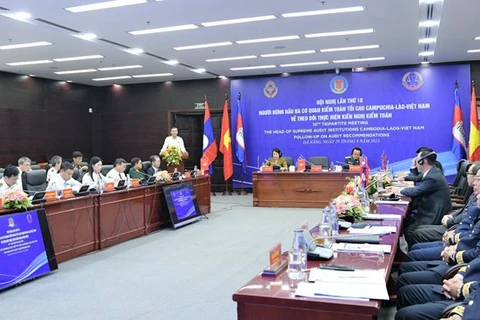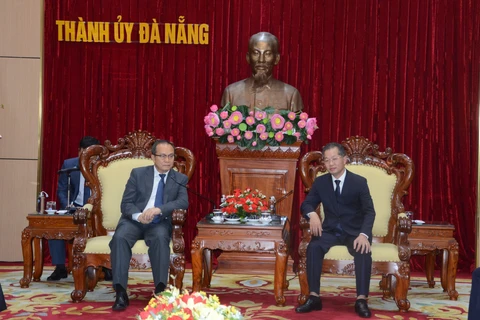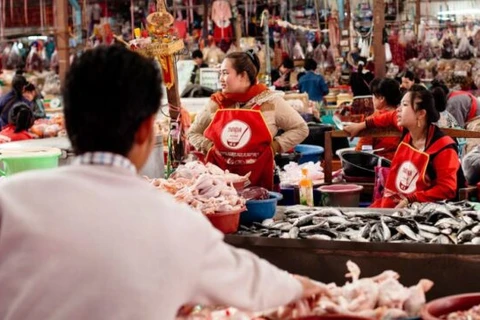Vientiane (VNA) – Lao Prime Minister Sonexay Siphandone has directed authorities to take actions to urgently address the country’s economic and financial difficulties amid continuing depreciation of the Lao kip, rampant inflation and high public debts.
The PM signed an eight-page order on August 29 that instructed concerned sectors to stabilise exchange rates, rein in the price rise and to do more to settle the debts owed to foreign countries, Vientiane Times reported on August 31.
The PM urged state agencies and society to join forces in the battle to address economic challenges and to overcome this difficult time.
One of the biggest challenges for Laos is stabilising the value of the Lao kip and ensuring adequate supply of foreign currencies needed to import goods.
Under the new order, the Bank of Laos has been directed to deal with any unlawful activities aimed at manipulating exchange rates.
The central bank was tasked to monitor and identify target groups that carry out money changing activities, using their personal accounts to run currency trading. The government warned it will penalise anyone who conducts money changing as this role is granted only to commercial banks.
The government ordered state agencies to implement measures that will bring in more foreign exchange to Laos and restrict imported goods.
The government announced it will cut public spending on non-essential projects and restrict the imports of luxury goods and products that Laos can produce.
In addition, the government will continue promoting the use of electric vehicles to reduce imports of fuel, one of main items requiring a large amount of foreign currency to import.
As of May this year, almost 4,000 electrically powered vehicles had been imported into Laos, saving hundreds of thousands of litres of fuel that would have to be imported.
The government’s next goal is to have 550,000 electric vehicles in use, accounting for at least 30% of all vehicles, and for 100 charging stations to be installed by 2030.
The PM instructed the Ministry of Finance to prioritise Lao products when buying office appliances for state agencies.
Official trips abroad by state officials to attend meetings, seminars and workshops must be selective, with only important topics for the nation being allowed.
Authorities are banned from buying expensive imported beverages, but they are permitted to buy locally made drinks to use for welcoming domestic and foreign guests.
Authorities are also not permitted to spend state funds for buying imported gifts for domestic and foreign guests.
Meanwhile, the Ministry of Foreign Affair was entrusted to study the visa policy, notably unilateral visa exemption and multi-visas granted to foreign visitors, as a means to attract more holiday-makers to Laos./.
The PM signed an eight-page order on August 29 that instructed concerned sectors to stabilise exchange rates, rein in the price rise and to do more to settle the debts owed to foreign countries, Vientiane Times reported on August 31.
The PM urged state agencies and society to join forces in the battle to address economic challenges and to overcome this difficult time.
One of the biggest challenges for Laos is stabilising the value of the Lao kip and ensuring adequate supply of foreign currencies needed to import goods.
Under the new order, the Bank of Laos has been directed to deal with any unlawful activities aimed at manipulating exchange rates.
The central bank was tasked to monitor and identify target groups that carry out money changing activities, using their personal accounts to run currency trading. The government warned it will penalise anyone who conducts money changing as this role is granted only to commercial banks.
The government ordered state agencies to implement measures that will bring in more foreign exchange to Laos and restrict imported goods.
The government announced it will cut public spending on non-essential projects and restrict the imports of luxury goods and products that Laos can produce.
In addition, the government will continue promoting the use of electric vehicles to reduce imports of fuel, one of main items requiring a large amount of foreign currency to import.
As of May this year, almost 4,000 electrically powered vehicles had been imported into Laos, saving hundreds of thousands of litres of fuel that would have to be imported.
The government’s next goal is to have 550,000 electric vehicles in use, accounting for at least 30% of all vehicles, and for 100 charging stations to be installed by 2030.
The PM instructed the Ministry of Finance to prioritise Lao products when buying office appliances for state agencies.
Official trips abroad by state officials to attend meetings, seminars and workshops must be selective, with only important topics for the nation being allowed.
Authorities are banned from buying expensive imported beverages, but they are permitted to buy locally made drinks to use for welcoming domestic and foreign guests.
Authorities are also not permitted to spend state funds for buying imported gifts for domestic and foreign guests.
Meanwhile, the Ministry of Foreign Affair was entrusted to study the visa policy, notably unilateral visa exemption and multi-visas granted to foreign visitors, as a means to attract more holiday-makers to Laos./.
VNA























